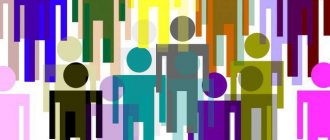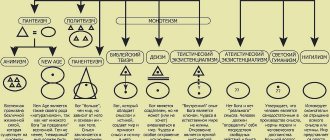Any person does not live on his own, he is surrounded by other people. He must live in society, obeying established requirements. This is necessary for the survival of humanity, the preservation of the unity of society and the reliability of its improvement. But society does not require a person to sacrifice his own material interests for his sake, because principles have been established that are designed to uphold the needs and benefits of the individual. The moral foundations and spiritual guidelines of the individual are paramount.
What are spiritual and moral guidelines?
This term usually means a set of rules for interaction with society and moral principles, patterns of behavior that a person focuses on to achieve harmony in life or spiritual development. These rules include:
- Morality and its components: conscience, mercy, freedom, duty (patriotism inclusive) and justice.
- Morality: this term contains the essence of a person’s high demand for himself in terms of his activities, directed both to the external world and to the internal one. The main moral guidelines are the desire for goodness and humility, the rejection of actions that bring harm to both society and oneself, as well as the spiritual development of one’s personality.
- Communication ethics implies tact and respect towards others; following these norms makes a person’s life acceptable in society, without condemnation or persecution.
SPIRITUAL GUIDELINES AS AN IMPORTANT PART OF HUMAN LIFE AND THE BASIS OF SOCIETY. article on the topic
SPIRITUAL GUIDELINES AS AN IMPORTANT PART OF HUMAN LIFE AND THE BASIS OF SOCIETY.
Maksakova Yu.N.
Chueva I.I.
SPIRITUAL VALUES ARE THE MAIN PART OF PEOPLE`S LIFE AND THE BASIS OF SOCIETY
Maksakova UN
Chueva II
Annotation. The article is devoted to the current problem of educating spiritual values as an important part of human life and the basis of society.
Abstract. The article is devoted to the actual problem of spiritual values`s education, which is the main part of people`s life and the basis of society.
Key words: spiritual guidelines, morality, ideal, values.
Keywords: spiritual values, moral, ideal, values.
Spiritual guidelines are a very important part of human life and the basis of society at all times. They originated in ancient times. A lot of time passed and the spiritual guidelines of the individual never lost their significance. At all times, people valued such qualities as honesty, justice, mercy, love for mother, one’s Motherland, kindness, and lies, hypocrisy, betrayal were considered qualities unworthy of “real people.”
The spiritual guidelines of a person include the most important concepts, the main ones of which are morality, values and ideal. Morality is a system of norms and rules governing the communication and behavior of people, ensuring the unity of public and personal interests. Morality includes ideals and values. An ideal is perfection, the highest goal of what a person strives for. Values are what is most dear to a person and humanity. Types of values can be divided into 6 groups. Values can be legal, moral, political, professional, religious and artistic [1]. Spiritual guidelines of the individual are very important in the life of society. After all, the spiritual guidelines of a person include patriotism, conscience, responsibility and other important personality traits.
The concepts of values are quite broad; every person values something. People's values do not always coincide with each other. Thanks to morality, people try to behave decently in society, but some people are not close to such concepts and therefore various crimes are increasingly being committed in our society. But most people are close to morals, values and ideals, as they are an integral part of our lives. Without them, there would not be much and we, people, would be completely different, many concepts would be alien to us and life would be completely different.
L.N. Tolstoy said: “The more you live a spiritual life, the more independent you are from fate, and vice versa”[2]. I think the meaning of Leo Tolstoy’s statement is that a person can build his destiny “with his own hands” only if he himself develops his spiritual world.
I agree with this statement. Anyone who develops himself not only physically, but also spiritually, is able to set the right goals for himself, achieve them, strive for the best, and look for his “ideal.” Every spiritually developed person should know that morals, values and ideals are the spiritual guidelines of the individual, and should always follow them. Then a moral principle will be formed in him, and he will be able to build his destiny “with his own hands.”
R. Descartes also said that a lame man with a lantern will reach his goal faster than a horseman wandering in the dark. That is, a person striving for spiritual life, capable of self-control and self-development, will be able to find the right guidelines in life. This confirms Tolstoy's words.
And vice versa, if a person does not develop spiritually, his existence will become ordinary and boring. He will not have goals in life and he will not be able to find his meaning in it. Therefore, it is so important that a person develops good qualities, morality, ethics, and then all his activities, his entire life will take on meaning.
Moral feelings begin to form in preschool age. Children already in their third year of life may exhibit personality traits such as sociability or shyness, independence or lack of self-confidence, selfishness or goodwill. The development of feelings in a child largely depends on the means and methods of education, on the conditions in which he finds himself. With targeted upbringing, a child’s feelings become much richer, more varied and appear earlier than in children who did not receive the “correct” upbringing. As A.S. said Pushkin: “Lack of education is the root of all evil”[3].
Moral feelings are formed in children in the process of their relationships with adults and peers. The task of instilling moral feelings in children is solved the more successfully the more humane the adults themselves are, the kinder and fairer they treat children. “All teachers of our time agree that in the matter of education the most important thing is to acquire the trust and love of a child, and that love is won primarily by love”[4]. The trust of adults, their constant care and support contribute to the positive emotional development of the child: he willingly and easily communicates with peers, shares his joys and sorrows with adults.
One of the most important conditions for the successful development of a child’s moral feelings is the creation by adults of a cheerful environment around the child. You should never extinguish children's joy. In an atmosphere of joy, such valuable spiritual qualities as goodwill, willingness to help, etc. easily arise. It is very important that adults correctly assess the child’s state of mind and share his joy with him.
Like any other feeling, joy in children depends on relationships in the family, since they are witnesses and participants in these relationships. As noted by the Russian writer and teacher A.N. Ostrogorsky: “Parents raise, and children are raised by the family life that develops intentionally or unintentionally. Family life is so strong because its impressions are constant, ordinary, that it acts unnoticed, strengthens or poisons the human spirit, like the air by which we live.” [5]
The development of morality in a person begins in the family and continues in kindergarten and school. In the latter institute it becomes more focused. Therefore, not only teachers and educators, but also parents should take care of the moral education of children.
In elementary school, the child begins to acquire certain knowledge. He has already formed some character traits that need to be further developed and directed in the right direction. It is at school that the moral character of an individual continues to be formed.
Adults are faced with the task of teaching children not only to look well-mannered outwardly, but also to be so, to have good human qualities. In order for an individual’s actions to comply with the norms and rules accepted in society, it is necessary that universal moral and spiritual norms be experienced by the pupil himself, so that the environment in which he lives implies a constant orientation of the individual towards universal human values. And only an adult can be this guide for a child, an example of correct behavior and imitation.
Nowadays, moral education becomes a necessity, since the world is filled with cruelty, rudeness and depravity. Family and school have a certain influence on the child’s understanding of how to behave correctly, what can be done and what cannot be done. And, of course, the leading role belongs to the family. Consequently, it is parents who must not only educate and instill moral qualities, but also develop all facets of their child’s personality. As Philip Lobstein said, “the task of moral education is to recreate a person from the inside, manually, and you should start with yourself.”
Literature
- Social studies 10th grade L.N. Bogolyubov - M.: 2014. - 351 p.
- https://mirkultura.ru Moral teaching of Leo Tolstoy.
- nsportal.ru Pedagogical views of A.S. Pushkin
- mama66/ru Moral education of children in the family, in kindergarten and school.
- Journal "Izvestia of Penza State University named after. V.G. Belinsky." Issue 28, 2012 Gritsay L.A. "A.N. Ostrogorsky about the main priorities of parental education of children in the family."
- Lobstein F. Lessons of reflection: pedagogy of moral development. lane with f. N. Malevich. M. Biblical-Theological Institute of St. Apostle Andrew. 2000. 84с C.79
Who set these standards?
Almost all socially adapted groups, castes and nations take as a guide the basic commandments of the religion they profess, or the teachings of authoritative sages.
For example, if a person is a believer, then he chooses the Bible, Koran or Bhagavad Gita as a spiritual guide, and if an atheist, then he may well follow the teachings of Confucius or Stephen Hawking.
Fundamental Concepts of Morality
In addition to directly regulating the course of action, morality also contains ideals and values - the embodiment of all that is best, exemplary, impeccable, significant and noble in people. An ideal is considered to be a standard, the height of perfection, the crown of creation - something to which a person should strive. Values are what is especially valuable and revered not only for one person, but for all of humanity. They show the individual's relationship with reality, with other people and with himself.
Anti-values reflect people’s negative attitude towards specific manifestations. Such assessments are different in different civilizations, among different nationalities, in different social categories. But on their basis, human relationships are built, priorities are established, and the most important guidelines are identified. Values are divided into the following categories:
- legal, or legal;
- state legal;
- pious;
- aesthetic and creative;
- spiritual and moral.
Primary moral values form a complex of traditional and moral orientation of a person associated with the concept of morality. Among the main categories are good and evil, virtue and vice, correlated in pairs, as well as conscience and patriotism.
Accepting morality in thoughts and activities, an individual must control actions and desires and place increased demands on himself. Regular implementation of positive deeds strengthens morality in the mind, and the absence of such actions undermines humanity’s ability to make independent moral decisions and take responsibility for its actions.
What does an immoral life give?
What are spiritual and moral guidelines for a person who goes against the rules of the system and does not want to live according to generally accepted commandments? After all, there are nihilists who deny everyone and everything, are they happy in their little world, which is very limited by their desperate protest. Some include anarchists among them, but the latter only deny the power of man over another being; they fully accept the dominance of moral norms.
The life of such people is actually sad, and in their declining years, most of them still turn their gaze to the moral values already comprehended by other people and the actions associated with them, thereby proving that the spiritual component is a powerful backbone of every outstanding society.
Spirituality of human life
The maturation of people coincides with their awareness of themselves as individuals: they try to evaluate personal moral qualities and develop a sphere of spiritual passions, including erudition, beliefs, emotions, sensations, desires and inclinations. Science defines the spirituality of human society as the full range of emotions and intellectual achievements of humanity. It concentrates knowledge and research of all spiritual traditions accepted by human society and the creative creation of new values.
An individual who is spiritually developed is distinguished by significant subjective characteristics and strives for lofty spiritual goals and plans, which determine the nature of his initiatives. Scientists consider spirituality to be an ethically oriented endeavor and human consciousness. Spirituality is seen as understanding and life experience. People with a poorly developed spiritual world or completely unspiritual are not able to perceive all the diversity and splendor of what surrounds them.
The advanced worldview considers spirituality to be the highest stage of formation and self-determination of an adult individual, when the basis and vital essence are not personal desires and attitudes, but the main universal priorities:
- good;
- mercy;
- beautiful.
Mastering them forms a value orientation, a conscious readiness of society to change life in accordance with these principles. This is especially important for young people.
Tasks
1. Do you think morality forces a person to act in a certain way or does it give freedom? Give reasons for your answer.
2. Scientists argue that value orientations determine a person’s life goals, the “general line of the individual.” Do you agree with this statement? Give reasons for your position.
3. The English thinker Adam Smith noted the importance of a wise and creative course of action, a combination of prudence with valor, with love for humanity, with sacred respect for justice, with heroism. “This prudence,” said Adam Smith, “involves the union of an excellent head with an excellent heart.” How do you understand the author’s thesis about “combining an excellent head with an excellent heart”? What, in your opinion, is the connection between this provision and moral values?
4. Academician B.V. Rauschenbach wrote: “Isn’t it alarming that the characteristics of “a successful businessman”, “a good organizer of production” sometimes turn out to be more important than the assessment of “a decent person”? Do you agree with the scientist's opinion? Give reasons for your position. Try to formulate your own definition of the concept of “decency”.
5. Russian sociologists conducted a study of students’ values. Students named the following value orientations as the most important in their lives: getting a good education - 29% of those surveyed; have an interesting job - 34%; get a prestigious job - 26%; achieve material wealth - 42%; have good health - 50%; my family - 70%; enjoy life - 26%. Named something else or found it difficult to answer - 5% of the students surveyed. How do you feel about these results? Which values from the list above do you consider most important to you? What would you add to this list?
Start
What is the basis for determining life values and guidelines? This is what we “measure” life by. For most of our parents and grandmothers, these were material benefits, in the form of an apartment, a car, a dacha. In the last century, you had to be like everyone else, equal to the best: excellent students, leaders in production, and so on.
Today, it has become easier to acquire material goods. The shortage has practically disappeared, new opportunities for earning money have appeared, and the variety of goods and services can excite any imagination.
This is one of the prerequisites for changing the system of values and guidelines of modern man. This contributed to the fact that one’s own realization came first, leaving the material aside.
Life guidance is an internal concept; it is difficult to define. It is difficult to determine and designate the subjective, internal coordinates of the soul and consciousness.
List of main features of value attitudes
Significance. They have weight and importance in the eyes of the one who owns them. At all costs, the owner strives to observe and protect them.
Awareness. As a rule, people are aware of what is important to them. Based on this understanding, they build a certain model of behavior, which they adjust to existing internal norms and rules with the help of self-control and self-discipline.
Self-sufficiency. Personal guidelines do not need the approval or advice of others.
Positive character. These beliefs are not perceived by the individual as obligations. They are not burdensome, but evoke only positive emotions.
Definition of the concept and signs
Life values are a kind of absolute that occupies a primary position in worldview. We are guided by them, setting certain goals for ourselves, and through their prism we evaluate our actions, desires, as well as the behavior of other people. With their help we set priorities.
To become a value guide, an existing phenomenon of reality must receive an emotional response and a rational explanation of its significance for a particular person. Therefore, you cannot impose your coordinate system on another.
In the process of formation and development of personality, values can and will certainly change. In childhood, some things come to the fore, in youth, others, and in adulthood, absolutely opposite ones. A person’s priorities directly depend on the events he experiences and the influence of certain ideas on him. Some situations can turn your mind around, look at your life from a different angle and completely rethink your hierarchy of guidelines.
What life values can be
Universal. Otherwise they are called cultural. Based on these ideas, society forms concepts about how one should act and how one should not. In the individual’s worldview, they are formed in the process of upbringing in the family.
These include:
- health;
- education;
- social status;
- Love;
- family bonds;
- children;
- development;
- self-realization.
Individual. They arise over the course of life. These are not just beliefs that are broadcast by public consciousness, but the personal attitudes of each person.
Key Value Guidelines
I classify them in two directions:
- Material. This includes everything related to a comfortable life, housing, and financial solvency.
- Spiritual. Something that cannot be felt with the help of the senses, but has great weight at the mental level. Family, friends, career, favorite business, education, health, beauty and so on.
However, it is almost impossible to strictly separate one category from another. One way or another, they are closely intertwined and cannot exist in isolation.
What are the personal values in a person’s life:
- Activity.
- Serenity.
- Impartiality.
- Gratitude.
- Inspiration.
- Cheerfulness.
- Flexibility.
- Spirituality.
- Entertainment.
- Daydreaming.
- Wisdom.
- Reliability.
- Independence.
- Security.
- Certainty.
- Organized.
- Mindfulness.
- Frankness.
- Openness.
- Devotion.
- Attractiveness.
- Affiliation.
- Proactivity.
- Determination.
- Modesty.
- Stability.
- Courage.
- Hardness.
- Accuracy.
- Moderation.
- Uniqueness.
- Financial independence.
- Thrift.
- Sensuality.
- Generosity.
- Brightness.
- Altruism.
- Heroism.
- Optimism.
- Pragmatism.
- Practicality.
- Professionalism.
- Realism.
- Balance.
- Wealth.
- Hospitality.
- Benevolence.
- Curiosity.
- Consistency.
- Perfection.
- Creation.
- Perseverance.
- Faith.
- Power.
- Imagination.
- Achievement.
- Knowledge.
- Study.
- Pleasure.
- Education.
- Understanding.
- Adventure.
- Confidence.
- Abundance.
- Wit.
- Opening.
- Justice.
- Acceptance.
- Development.
- Diversity.
- Sympathy.
- Hard work.
- Pleasure.
- Coolness.
- Hygiene.
- Depth.
- Discipline.
- Self-discipline.
- Friendship.
- Health.
- Comfort.
- Beauty.
- Logics.
- Love.
- World.
- Hope.
- Experience.
- Victory.
- Support.
- Peace.
- Benefit.
- Is it true.
- Simplicity.
- Height.
- Self-control.
- Freedom.
- Family.
- Glory.
- Passion.
- Happiness.
- Tradition.
- Energy.
- Synergy.
- Success.
- Purity.
- Humor.
This is not a complete list of value guidelines existing in the world. Based on it, you can create your own hierarchy by adding other concepts.
Pyramid of Values
A. Maslow’s famous scheme, which describes human needs, can also characterize the system according to which life priorities are built. The foundation of human existence as a whole is its biological component. There are motives that physiology dictates to us: in other words, it is difficult to talk about the eternal when you are hungry, cold or in pain.
The next stage in the formation of priorities is the desire for security. This includes the desire to organize
After this, social needs arise, the need for respect and recognition, the thirst for knowledge and creativity, aesthetic and spiritual values.
How do worldviews and life values relate?
A person's values are determined by his worldview. Take, for example, a person who grew up in a religious family. He looks at the world from the position of a believer. His values in life will be appropriate.
It is worth noting that worldview is a very multifaceted concept. There are cases when both it and human values are alien to internal sensations. A person suffers from doubts about the correctness of his life attitudes and loses spiritual harmony. These circumstances can trigger a complete personality change. Goals, priorities, values will become different.
Why is a value system important?
Prioritizing our value system makes us who we are. Two siblings could differ from each other in that they put different things first in life. Remember Cain and Abel. Their values were different.
Differences in value systems influence who we choose as friends and who becomes our chosen one. If love and attention are important to a woman, and money comes first for a man, how long will their union last?
Years later, this woman may realize that money is not so bad, and feelings are just chemistry in the blood. And the man will understand that money will not make him happy. At this point, these two may come together. Their value systems will not be so radically different.
Focal object method: essence, advantages and disadvantages
Various circumstances can provoke a change in a person’s hierarchy of values:
Having had an accident, a person will begin to take more care of his health.
Having lost someone close, he will put love and relationships with people first.
Having met a wealthy classmate, a simple cashier may put money first, start climbing the career ladder, and look for ways to make money.
This is how we change under the pressure of circumstances.
By this principle we choose friends: our values are similar to them. And because of this we are losing them. The values just changed and we stopped understanding each other.
It is especially important that spouses have the same values. They must think and act based on common goals. This is the secret of a strong marriage: both parents try for the sake of the children or live only for themselves. The values of spouses may differ, but not radically. If the wife puts money first and the husband comes last, they will definitely not be a couple for long.
Choice
If you prefer to find solutions yourself, then you will have to work hard. The first thing you need to do is to determine your own life guideline, which at this stage gives you direction in life. Take paper and pen. Designate all your “life roles.” Child, spouse, parent, member of any community (church, party, organization, etc.), employee, boss, friend. Whatever you are doing at the moment. Next to each role entry, write the person's name. This should be someone whose assessment of your performance in this role is important to you. Now think about how he could answer the question: “What are you like?” Write down your thoughts. This will help you understand what exactly constitutes your value system at this stage.
Remember what you dreamed of doing in childhood, youth or the recent past. Try starting something new.
Try to discover your hidden talents. If you do not realize your inner potentials, this can cause you to feel empty inside yourself, lacking vitality and motivation. Observe carefully what gives you pleasure personally. What brings joy and a sense of self-satisfaction. Does this activity make you happy or increase your self-esteem? Is it difficult to figure it out on your own? Experts will help you. Psychologists, psychotherapists.
The role of life values
Each person should clearly understand their internal coordinate system. This understanding will help when solving difficult issues, at the moment when it is necessary to make a choice. Awareness of what is actually primary for you at a given moment in time will allow you to avoid global mistakes and regrets.
The hierarchy of significant attitudes is individual. Based on it, the individual builds his life. Very often you have to choose between two important things; stopping internal torment and doubts is precisely what helps you analyze your own guidelines and priorities. There is no clear, right or wrong answer to the question of what a person's core values should be. It all depends on the attitude of a particular individual.











